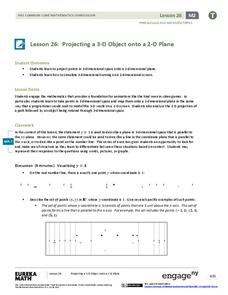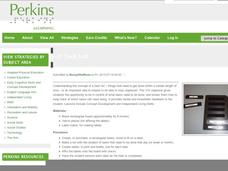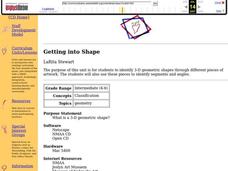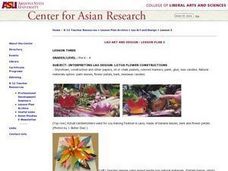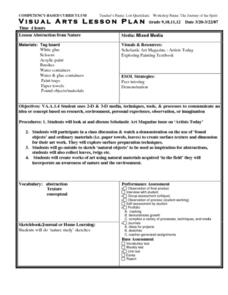EngageNY
Projecting a 3-D Object onto a 2-D Plane
Teach how graphic designers can use mathematics to represent three-dimensional movement on a two-dimensional television surface. Pupils use matrices, vectors, and transformations to model rotational movement. Their exploration involves...
Mathematics Assessment Project
Representing 3-D Objects in 2-D
How does the shape of the surface of water in a container change as water leaks out? After tackling this question, learners take part in a similar activity with more complex figures.
Perkins School for the Blind
3-D Task List
Staying organized is a part of growing up, and it can be as easy as making a list. Here is a set of instructions for making a three-dimensional task list especially for learners with visual impairments or blindness. After making the task...
Curated OER
Geometry Vases: Ceramics Lesson
Geometric shapes are used in math and in art. Learners discuss the various names, dimensions, and attributes of geometric shapes, then apply that knowledge to design a vase. They use 3-D shapes to make a cubist-style vase out of clay.
Curated OER
Making a desk organizer for students who are blind or visually impaired
Organization is of the utmost importance when teaching orientation and mobility to learners with visual impairments. To help keep everything in order and provide independence, use these instructions for making a desk organizer. The...
Curated OER
Applied Science - Science and Math Lab
Create three dimensional objects in an applied science lesson plan. The goal is for your class to recognize, compare, and model shapes. Using cookie cutters and clay or play dough, they create models for three-dimensional shapes.
Curated OER
3-D Figures Part 2
Students work with three dimensional objects. In this geometry lesson, students examine models of spheres, cones, cubes, prisms, and pyramids, and identify them by their edges, vertices, and faces.
Teach Engineering
Let's Learn About Spatial Viz!
Can you see your class working on spatial visualization? The first installment of a five-part module introduces the concept of spatial visualization and provides a 12-question diagnostic assessment to test spatial visualization skills....
Curated OER
Getting into Shape
Students identify 3-D geometric shapes through different pieces of artwork. They examine and identify segments and angles. Students act out shapes and create a piece of artwork. Additional cross curriculum activities are listed.
Curated OER
Lao Design: Lotus Flower Constructions
Students create lotus flowers in 3-D designs applying Lao art techniques. Following a teacher demonstration, they assemble their own lotus flower candleholders and the teacher arranges a group flotation in a body of water. Students...
National Gallery of Canada
Build a City of the Future!
Tap into your pupils' imagination by asking them to design futuristic, ideal cities. They must discuss and take scale and size into account, looking at some model pieces of art for inspiration and analysis. The final product for each...
Curated OER
Teaching and Learning Through Objects
Students identify and interpret the function, usefulness or utitlity, form, beauty or aesthetics, and meaning, context or story, of objects and how they learn new skills and make things that they learn traditionally, by observation and...
Curated OER
3-D Design - Painting
Students explain elements of relief sculpture. They create a sculpture from foam. They identify characteristics of the art of Clayton Pond and Pop Art. They develop skills in working with color.
Utah Education Network (UEN)
Insides and Outsides
Give small groups handfuls of unit cubes and then dare them to build as many rectangular prisms as possible using only 12 cubes. This engaging activity serves as an introduction to the volume of solid figures. In addition to volume,...
Curated OER
3D Computer Imaging Class: Cross-Section Lesson
Students use 3-dimensional materials to create a simple 3-D object. They think about different ways the object could be sliced. Students choose one way to slice the object, and draw the sliced shape on paper or computer. Using a 3-D...
EngageNY
Coordinates of Points in Space
Combine vectors and matrices to describe transformations in space. Class members create visual representations of the addition of ordered pairs to discover the resulting parallelogram. They also examine the graphical representation...
EngageNY
How Do 3D Printers Work?
If we stack up all the cross sections of a figure, does it create the figure? Pupils make the connection between the complete set of cross sections and the solid. They then view videos in order to see how 3D printers use Cavalerie's...
Curated OER
Reflections Of Me!
Students create a 2-D and 3-D work of art depicting qualities and experiences from their own lives. This innovative lesson uses hollowed out, recycled books as the "art canvas" for the project.
Curated OER
How many edges do I need to cut in order to open a cube?
Young scholars problem solve to open a cube to create different shapes. In this problem solving lesson plan, students are given a cube and the shapes to open it up to, and they have to cut the cube open to make certain shapes. This gives...
Curated OER
Building Buildings
Seventh graders investigate 2-D and 3-D objects. In this geometry instructional activity, 7th graders begin to understand spatial reasoning. Students look at pictures of the NYC Skyline and discuss what it looks like from different...
Curated OER
Contour Drawing
Students create a contour drawing of a hand creating an illusion of depth. After a brief demonstration of contour drawing, students practice by creating pictures of various objects. The final project consists of creating a contour...
Curated OER
More of Carrie's Cubes
Students solve a word problem that explores the shape of a cube and ways that part of it can be colored. They discuss the problem and analyze a Rubik's cube, explore the problem using a graph, and discuss the solutions as a class.
Curated OER
Spacemobiles
Aspiring astronauts construct a space vehicle using cylinders, cones, spheres, and rectangular prisms. This is an engaging method of learning about three-dimensional shapes. Note that the word cylinder is constantly misspelled in the...
Curated OER
The Journey of the Spirit
Learners discuss Scholastic Art Magazine issue on 'Artists Today' . They participate in a class discussion & watch a demonstration on the use of 'found objects' and ordinary materials (i.e. paper towels, leaves) to create surface...
